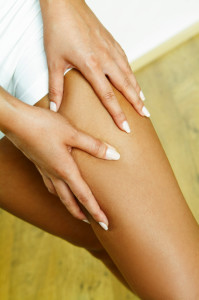Spider Veins – The 411
- Posted on: Apr 15 2016
You’ve no doubt seen them and perhaps you even have them – those tiny blood vessels just below the surface of the skin that bear a scary resemblance to the creepy creatures whose name they share.
- Spider veins can be a result of exposure to the sun, obesity, standing for long periods of time, or pregnancy. They may also be genetic or may appear as part of the natural process of aging. They are unsightly and embarrassing regardless of their cause.
- Luckily, sider veins can be treated in our office with sclerosing agents, which are injected to remove the spider veins.

- Studies show that one-third of all women experience spider veins; the percentage of men appears to be much smaller.
- Spider veins are clearly visible and can be purple, red or blue. They usually appear on the lower legs, thighs, nose and face. Unlike varicose veins, they do not bulge above the skin surface.
- Some physicians may conduct an ultrasound exam to determine the extent of the problem and the underlying cause of the condition.
- Spider veins usually appear as a “tree-branch” pattern, a “sunburst” or spider-web pattern or a linear pattern that appears as a set of thin lines.
- Spider veins are much smaller than varicose veins and are the mildest manifestation of venous insufficiency. Although they may cover large areas, they are a cosmetic problem, do not require medical treatment and rarely cause physical symptoms.
Sclerotherapy has been used for centuries to treat spider veins and is the most widely used medical procedure for their treatment. The technique involves injecting a sclerosing substance into the abnormal veins to destroy them and aid in their reabsorption. The procedure is sometimes followed by compression with bandages or stockings.
Schedule a Consultation
Results are amazing! Don’t wait…call to schedule a consultation appointment, today, and get your legs summer-ready: (212) 391-8600.
Posted in: Aesthetic Procedures

